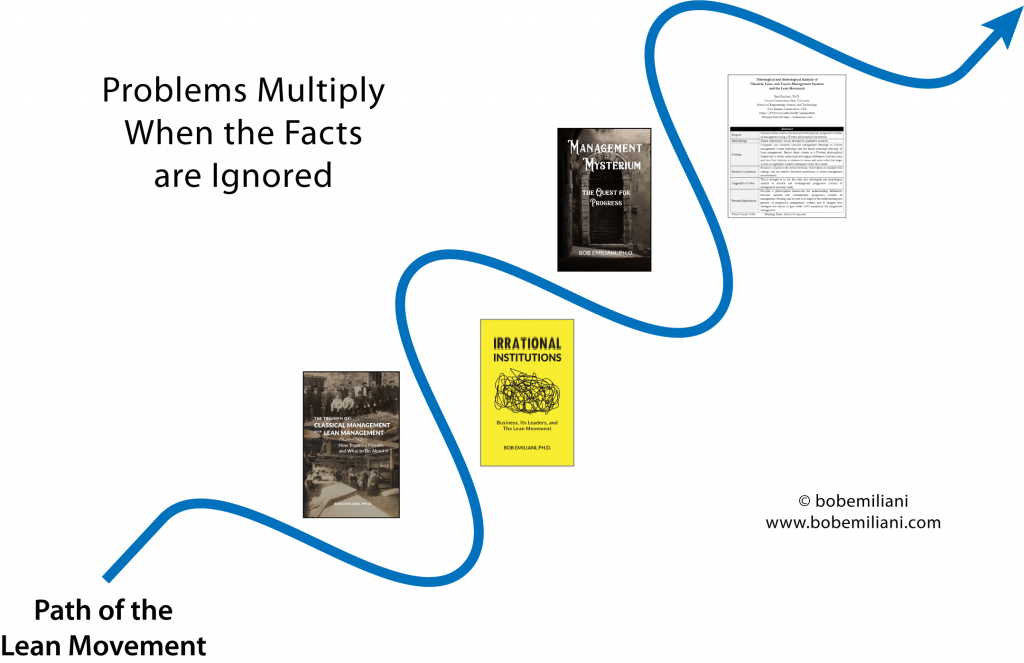Path dependence means that what happened in the past is likely to persist in the future because of resistance to change. The sources of resistance to change usually boils down to doing what is best for an organization or its leaders, and could be financial, to assure continuity with past decisions, personal pride in what has been accomplished, to dodge embarrassment, or to avoid unpleasant facts. Any hierarchical organization is subject to path dependence (positive feedback). That includes organizations whose mission is to promote Lean management. They are prone to path dependence given that they are, first and foremost, a business and, further down the list of importance, a resource to help Lean practitioners and to expand acceptance for Lean management. That, as you will see, is tragic.

Facts that disrupt path dependence, and thus business strategy (i.e. static “deliberate strategy”) and goals, are purposefully avoided as shown in the above image. In contrast, dynamic (i.e. evolutionary) “emergent strategy” recognizes and absorbs ideas from multiple sources and integrates them into future activity. The promotion of Lean management is teleological, which means it must exclude ideas from other sources, especially those that interfere with path dependence. This is a critically important mistake, one that unfavorably impacts Lean practitioners. Namely, the inculcation of static purpose (teleology) over learning and evolution (ateleology) Click here to learn more about teleology and ateleology.
Simply put, path dependence and teleology retard learning not only in the organizations that promote Lean, but it also retards learning in the people who closely follow or rely on such organizations for information or guidance. I have said that the enemy of Lean is classical management. But another enemy of Lean is the business of promoting Lean. Its focus on path dependence means Lean practitioners get swallowed up in their path dependence. You follow such organizations at your own peril. Instead, Lean practitioners can apply a personal “emergent strategy” to escape the Lean promoters’ path dependence by taking in all the information you can and sort through it to determine what you need at any given point in time to help you make progress in both your understanding of Lean management and your practice of it at work. In other words, think for yourself. I have great confidence in your intelligence, but the businesses promoting Lean hopes you lack self-confidence and, through its marketing efforts, works to instill a lack of self-confidence in Lean practitioners. There is no need for such dependency.
Lean management itself, and the Lean movement, purportedly being all about “change for the better,” long ago became mired in “change if continuity is maintained.” One can clearly observe this over many years of leadership decision-making in the organizations that promote Lean. Of course, commitment to path dependence is hypocritical to the precepts of Lean, but that is only a minor problem. The larger problem is that by ignoring the facts — the “institution of leadership,” how leaders think and why they do what they do, and the eight categories of archaic preconceptions that have entrenched classical management — dedicated and well-meaning Lean practitioners expose themselves to possible harm, having no clue of the hazards that they face and how to navigate them. In this way, the Lean promoters treat Lean practitioners with the same low respect that employees experience in the workplace from their leaders.
Expensive online and in-person conferences are designed to share success stories and raise the motivation and passion for Lean. These may be necessary, but they are much less helpful than they appear because they lack any serious scientific inquiry into why something works or does not work. Serious scientific inquiry would move Lean from path dependence to an emergent strategy for expanding the number of organizations whose Leaders accept Lean management. Absent that, what we get is a steady state of companies that adopt Lean management and companies that abandon Lean management at approximately equivalent rates. Thus, the number of organizations whose top leader accepts Lean management does not grow over time. Under such circumstances, the principal beneficiary of Lean is the businesses promoting Lean, not its customers. You may have thought the business of promoting Lean was better than that, but it is not. It is the same as any other business and thus welcoming to the visible hand of classical management.
The leaders of the Lean movement — all of them, as far as I can tell — clearly find it in their interest to ignore the facts at the expense of Lean practitioners and the advancement of Lean management. I expect no change in Lean’s path dependence and teleology for the foreseeable future. Lean movement leaders will not allow it. So, knowing that, you should confront the facts through your own initiative and think for yourself.
